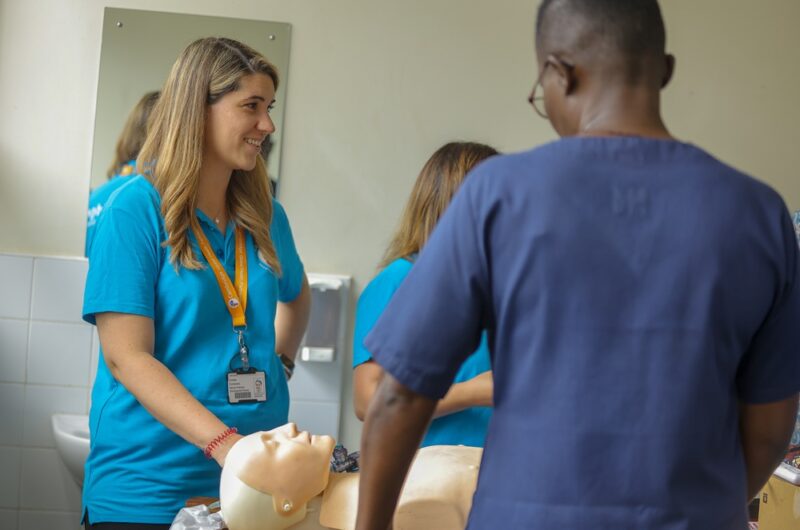By Celeste Formenton
Celeste Formenton is a Critical Care Practice Development Senior Sister at Cambridge University Hospitals NHS Foundation Trust (CUH). Here she reflects on the progress made through the SCALE Critical Care Project and the impact it’s had on her as an educator.
“Global health is everyone’s responsibility. I am not originally from the UK and I know how it looks to live in different situations, with less resource and support available. I studied in my own country but then left as I did not think the health system was adequate both in terms of nursing care and resources. Global health started to interest me more and more as I kept noticing the differences between my own country and the UK, and then low- and middle-income countries. Supporting other countries should be everyone’s responsibility, especially from countries who have a lot and do not realise how much they can offer. Anyone can help and every little support and contribution will have an impact.
The SCALE critical care project is about collaborative working between UK and Ugandan critical care nurses to share knowledge and experiences that will improve patient outcomes. The visit was an opportunity to meet amazing people who provide the best care they can with the limited resources they have. It made me reflect a lot about team working and dynamic, the waste of resources and innovative ideas that can be integrated into patient care.
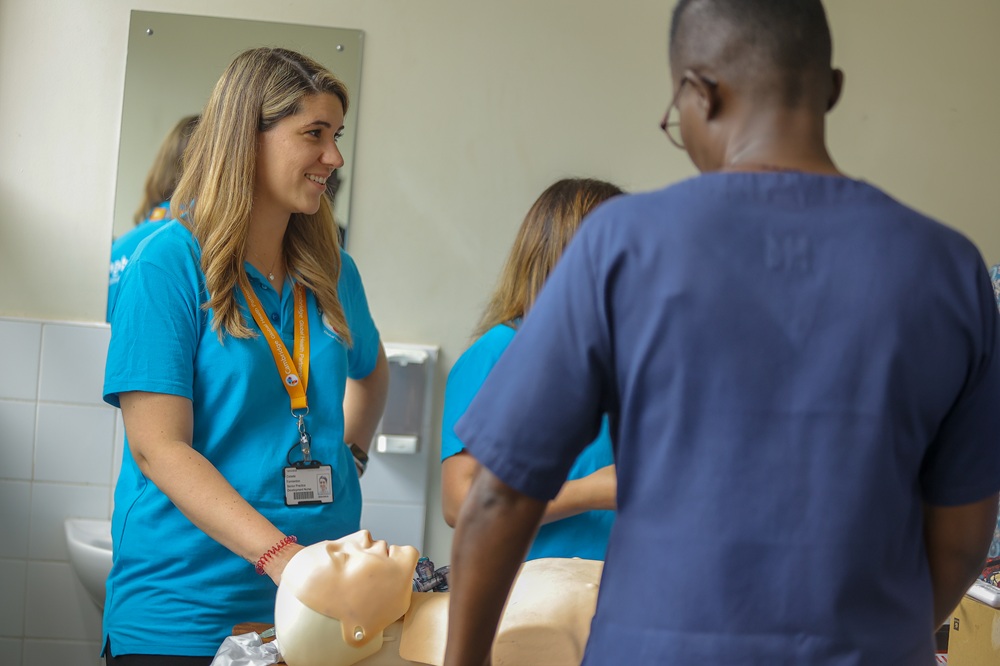
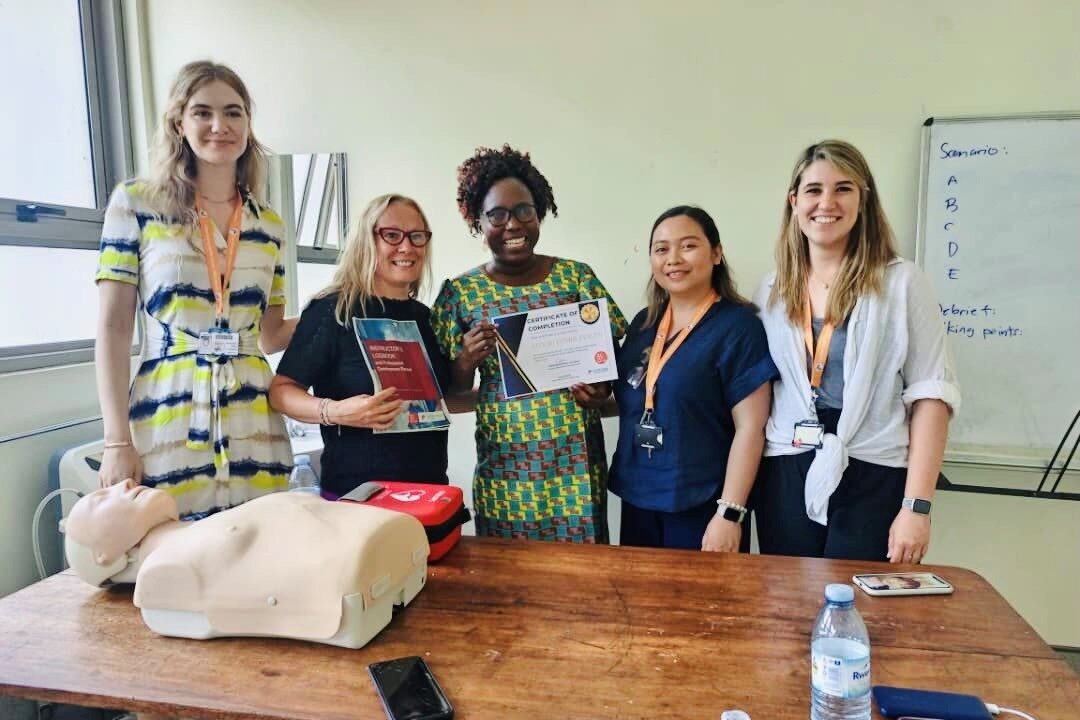
Contributing individually and as a team
As a team, we separated into three groups (one in Mulago National Referral Hospital, one in Kawempe National referral Hospital and the last one composed of midwives only at Mulago Specialised Women & Neonatal Hospital). The nursing groups provided a two-day training course to Ugandan nurses at each hospital. The training was designed for nurses but, quite often, we would have doctors joining our training too. The same two-day training course was then delivered to another group of attendees over the next couple of days.
I contributed with critical care nursing training through low-fidelity simulations on the critical care units, alongside some lectures. My colleagues and I supported the Mulago ICU team with refresher training that included assessment of the deteriorating patient (ABCDE assessment), basic and intermediate life support and effective and safe team communication.
I believe I made the biggest impact by teaching and refreshing the knowledge of the Ugandan nursing colleagues about basic/intermediate life support training and how to use the automatic defibrillator (AED) safely. Even though we donated two AEDs, some nurses highlighted the fact they worked in other units in where the AED was not available. I then covered different scenarios about how to resuscitate a patient without AED, as well as facilitating simulations about these areas to consolidate their learning.
One day, I facilitated a simulation about Basic Life Support. As soon as I turned my back, one nurse was teaching the others by recapping the key information and showing correct hands placement and technique. I found this extremely rewarding as this is what I was hoping would happen, to make the changes sustainable.
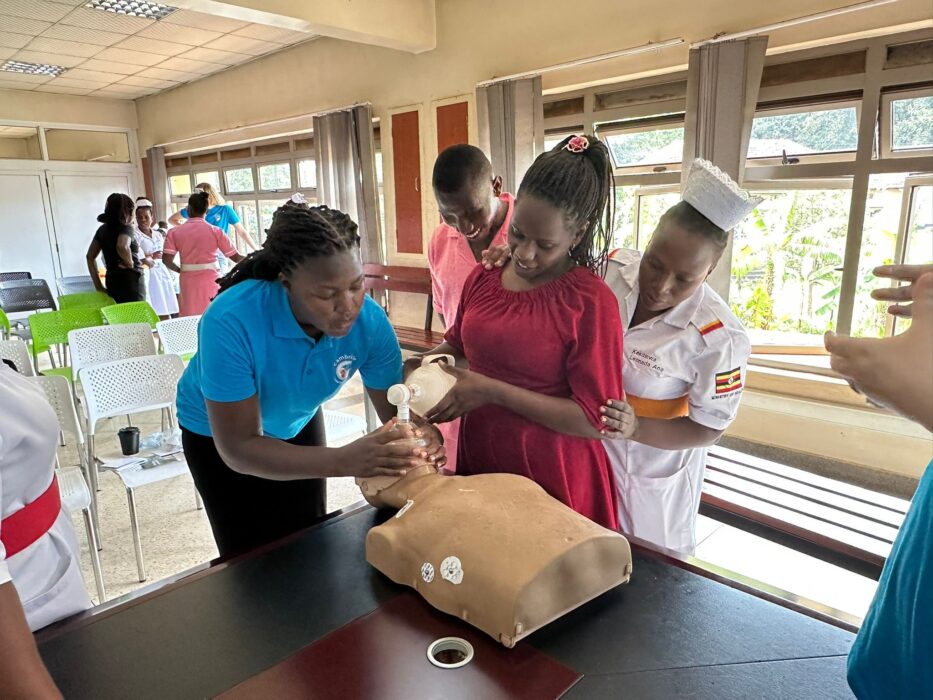
Challenges and rewards
The most challenging aspect of the experience was visiting the High Dependency Unit (HDU) at Mulago hospital. The HDU nurse in charge attended our training programme and wanted to show us her unit afterwards. We followed her and I saw a young patient lying in bed with a few fractures, with a tracheostomy open to the air who was really struggling to breathe and had a high heart rate. I was worried he was in that situation because of sepsis, I asked the HDU nurse who told me that his family ran out of money and could not buy him antibiotics. Also, he was not lying on sheets, but just a blanket because his family could not afford to provide linen anymore. Even though I saw the ICU before and I knew this is the system the hospital operates with, that young boy stayed in my mind as I thought of his discomfort and how much I wish I could help him. I was also worried he might go into cardiac arrest soon, which is why it would have been beneficial for the HDU to have a defibrillator too.
The most rewarding experience, on the other hand, was to see the differences from the first time I went to Kampala. The nurses reported there had been positive changes and it was great to see how they implemented some of the practices we suggested. Moreover, the ICU staff were teaching alongside us and sharing the knowledge with their fellow colleagues. One staff member told us how much he appreciated our input so he could develop as a trainer. He now feels comfortable in teaching others, in a supportive way.
One day, I facilitated a simulation about Basic Life Support. As soon as I turned my back, one nurse was teaching the others by recapping the key information and showing correct hands placement and technique. I found this extremely rewarding as this is what I was hoping would happen, to make the changes sustainable.
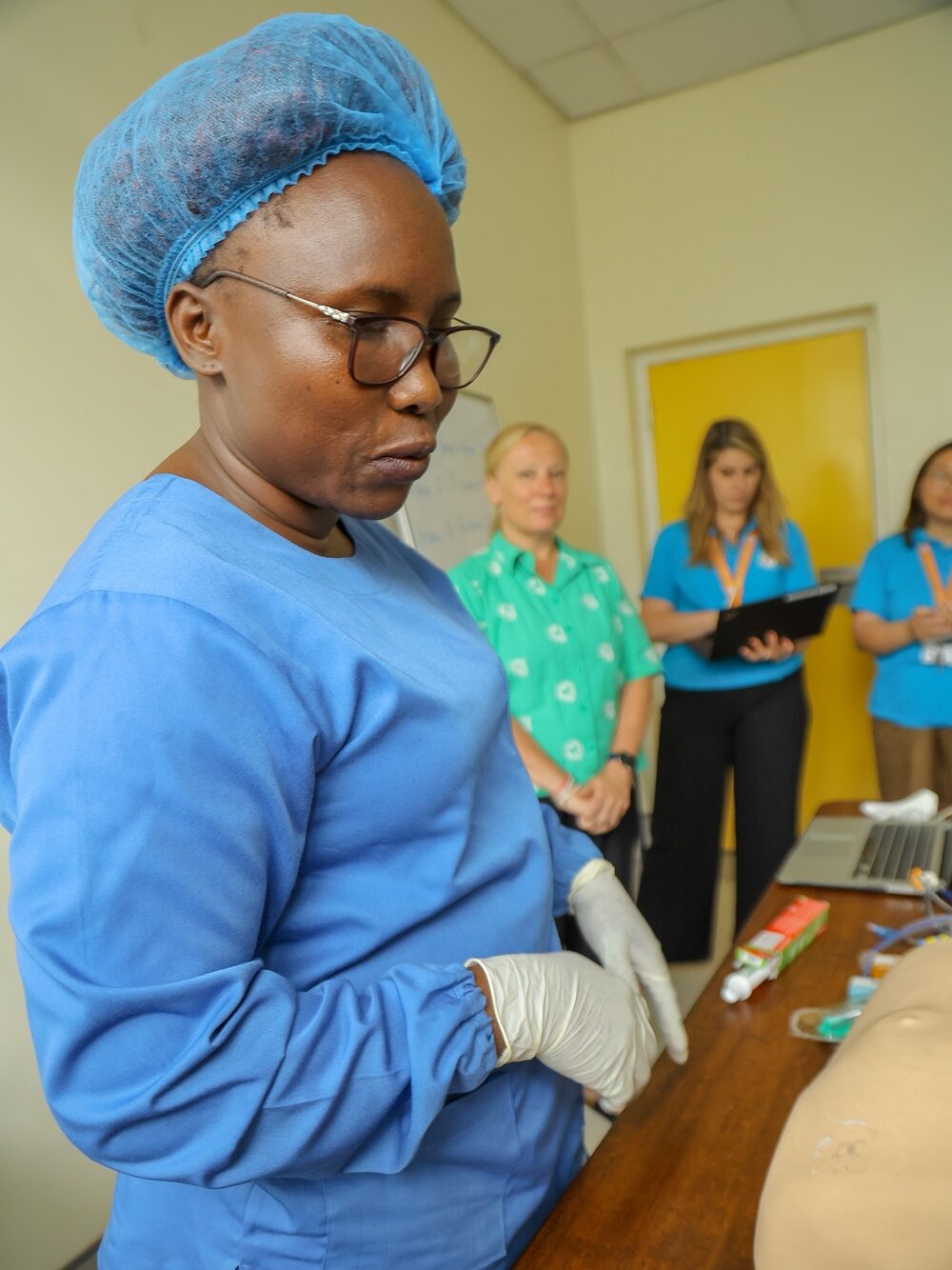
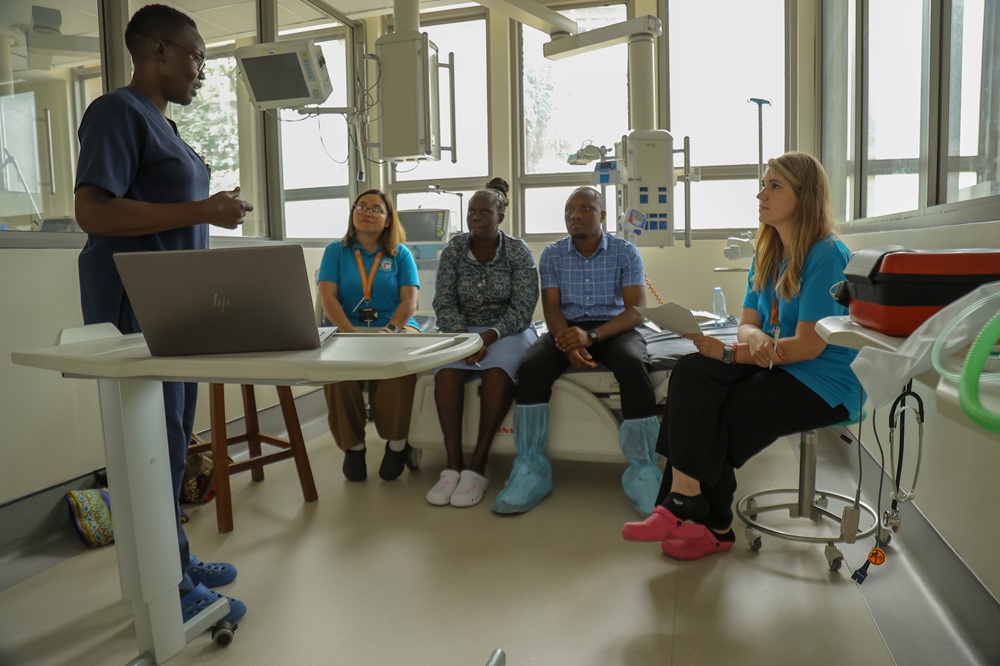
Personal and professional development
The “pearl of Africa” has a very special place in my heart now. I met some of the most amazing people, who welcomed me and made me feel loved and accepted from the very first day. I have been in touch with some Ugandan nurses from my very first trip and it was so beautiful to be able to see them and hug them again. It developed me personally because I felt like we are all part of the same team, even if we are miles away. It made me reflect on the way I approach my UK colleagues, patients and families. There is a strong sense of community in Uganda, which is what I was used to in my own country and that I think is lacking in the UK. This made me reflect on how I can be a more approachable and available person too.
From the educator point of view, it developed me professionally, as I needed to adapt my teaching style and skills to the environment and situation I was in. I am used to teaching in a very organised and structured environment, where I do not even need to think or worry about Wi-Fi connection or devices. In Uganda, I had to think out of the box (which I really enjoyed) and change the plan of the day as it went along.
I learnt to be adaptable and be ready to (sometimes) improvise, depending on the situation. I learnt how to be more inclusive in the way I teach: for example I usually tell my learners that some lung breath sounds are similar to when you rub your hair close to your ear. As I was about to say that in front of my Ugandan colleagues, I realised none of them had long straight hair, so I quickly thought of an alternative example. Obviously, this can happen also with my UK learners, but I never thought about it!
Another example is when, in a simulation scenario, I had to describe a patient in cardiac arrest. I would usually say “they look grey and unwell”, and I thought that grey was not very applicable! Hence, I switched narrative quickly saying that they could see pallor in the patient’s eyes and mucosa. Again, I should be more careful and integrate these comments in my daily teaching activities so that I can be more inclusive.
Equally, I also learnt a lot on this recent trip: the ICU staff shared their knowledge about paediatric nursing care and neonatal resuscitation, alongside pregnancy related problems – these are all areas where I lack knowledge and I’m glad they could share their expertise with me. Moreover, I also refreshed my memory about resuscitation and use of drugs. I reflected about teamwork, resilience and appropriate use of resources.
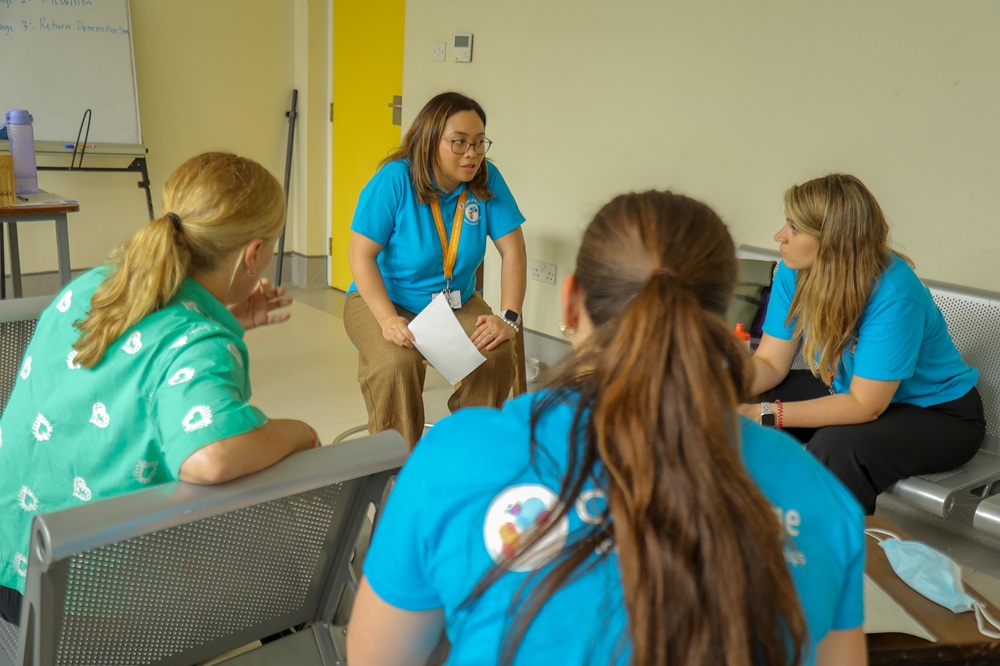
Highlights
My favourite experience of this trip happened one evening, when we had dinner with a group of senior Ugandan nurses who are playing a vital part in this partnership. While sitting at the table waiting for dinner, we played a game to get to know each other better and then we shared some observations about the partnership. One nurse said that since the project started, her knowledge and confidence in looking after critically ill patients has improved enormously. Most importantly, her hospital now recognises her value, her skill-set and her knowledge and will keep her in ICU rather than moving her to work in other ward areas. This gave me goosebumps as she was speaking and made me feel extremely proud of the hard work put in over these last few years.”
Find out more about the SCALE Critical Care Project, the CGHP Grant Scheme, or contact us at info@cghp.org.uk
Return to blogs

